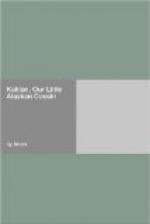“Teddy, do you know we are to have some hunting to-day, and that you’ll get your first experience with a glacier.”
“Hurrah,” shouted Ted, dancing up and down in excitement.
“Tyee Klake says we can hunt toward the base of the glacier, and I shall try to go a little ways upon it and see how the land lies, or, rather, the ice. It is getting warmer, and, if it continues a few days, the snow will melt enough to let us go over to that island you are so anxious to see.”
Ted’s eyes shone, and the amount of breakfast he put away quite prepared him for his day’s work, which, pleasant though it might be, certainly was hard work. The chief said they must seek the glacier first before the sun got hot, for it was blinding on the snow. So they set out soon after breakfast, leaving Chetwoof in charge of the camp, and with orders to catch enough fish for dinner.
“We’ll be ready to eat them, heads and tails,” said Ted, and his father added, laughingly:
“‘Bible, bones, and hymn-book, too.’”
“What does that mean?” asked Ted, as Kalitan looked up inquiringly.
“Once a writer named Macaulay said he could make a rhyme for any word in the English language, and a man replied, ‘You can’t rhyme Timbuctoo.’ But he answered without a pause:
“If I were a Cassowary
On the plains of Timbuctoo,
I’d eat up a missionary,
Bible, bones, and hymn-book, too.”
Ted laughed, but Kalitan said, grimly:
“Not good to eat Boston missionary, he all skin and bone!”
“Where did they get the name Alaska?” asked Ted, as they tramped over the snow toward the glacier.
“Al-ay-ck-sa—great country,” said Kalitan.
“It certainly is,” said Ted. “It’s fine! I never saw anything like this at home,” pointing as he spoke to the scene in front of him.
A group of evergreen trees, firs and the Alaska spruce, so useful for fires and torches, fringed the edge of the ice-field, green and verdant in contrast to the gleaming snows of the mountain, which rose in a gentle slope at first, then precipitously, in a dazzling and enchanting combination of colour. It was as if some marble palace of old rose before them against the heavens, for the ice was cut and serrated into spires and gables, turrets and towers, all seeming to be ornamented with fretwork where the sun’s rays struck the peaks and turned them into silver and gold. Lower down the ice looked like animals, so twisted was it into fantastic shapes; fierce sea monsters with yawning mouths seeming ready to devour; bears and wolves, whales, gigantic elephants, and snowy tigers, tropic beasts looking strangely out of place in this arctic clime.
Deep crevices cut the ice-fields, and in their green-blue depths lurked death, for the least misstep would dash the traveller into an abyss which had no bottom. Beyond the glacier itself, the snow-capped mountains rose grand and serene, their glittering peaks clear against the blue sky, which hue the glacier reflected and played with in a thousand glinting shades, from purpling amethyst to lapis lazuli and turquoise.




